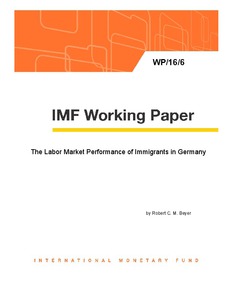The labor market performance of immigrants in Germany
"The paper uses a large survey (GSOEP) to analyze the labor market performance of immigrants in Germany. It finds that new immigrant workers earn on average 20 percent less than native workers with otherwise identical characteristics. The gap is smaller for immigrants from advanced countries, w...
| Main Author: | |
|---|---|
| Institution: | ETUI-European Trade Union Institute |
| Format: | TEXT |
| Language: | English |
| Published: |
Washington, DC
2010
IMF |
| Subjects: | |
| Online Access: | https://www.labourline.org/KENTIKA-19106258124919244309-The-labor-market-performance-o.htm |
| Summary: | "The paper uses a large survey (GSOEP) to analyze the labor market performance of immigrants in Germany. It finds that new immigrant workers earn on average 20 percent less than native workers with otherwise identical characteristics. The gap is smaller for immigrants from advanced countries, with good German language skills, and with a German degree, and larger for others. The gap declines gradually over time. Less success in obtaining jobs with higher occupational autonomy explains half of the wage gap. Immigrants are also initially less likely to participate in the labor market and more likely to be unemployed. While participation fully converges after 20 years, immigrants always remain more likely to be unemployed than the native labor force." |
|---|---|
| Physical Description: | 38 p. Digital |

